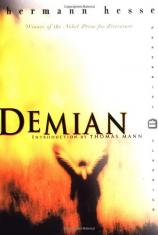Reading Group Guide
Discussion Questions
Demian

1. For the epigraph to his novel, Hesse quoted his protagonist: "I wanted only to try to live in accord with the promptings which came from my true self. Why was that so very difficult?" What promptings come from Sinclair's "true self"? Why is it "so very difficult" for him to live in accord with those promptings?
2. What characterizes the two realms that Sinclair identifies at the novel's beginning--the realm of light and the forbidden realm? How do the two realms interact throughout the novel, in terms of Sinclair's experience of them and in terms of what we learn about them? How does Sinclair's relationship to each change?
3. What is Max Demian's relationship with each of the two realms? In what ways does he embody elements of both?
4. Sinclair insists that "my interest centers on the steps that I took to reach myself." What are those "steps"? What specific incidents and stages mark Sinclair's movement from innocent childhood to self-aware adulthood?
5. What is the importance of the biblical story of Cain and the mark of Cain? How would you describe the repeatedly cited "sign" that is so important to Demian and his mother? What endows Sinclair with that sign?
6. What function do Sinclair's dreams serve? How does each relate to the stage of personal development during which it occurs?
7. What is "the dream of the lost paradise" to which Sinclair refers in Chapter 3 ("Among Thieves")? Why does he call it "the worst and most ruthless of dreams"?
8. What are the most important lessons that Sinclair learns from Demian? How do they affect his character and his life? Are all of the lessons learned beneficial? How relevant are they to living in today's world.
9. What is Pistorius's role in Sinclair's progress? What are the similarities and differences between his influence on Sinclair and Demian's influence? Why does Pistorius's influence come to an end while Demian's continues?
10. What is the importance of Sinclair's three paintings of the heraldic bird, "Beatrice," and Frau Eva? What purposes and consequences are associated with each? What is the significance of the fact that they seem to contain opposites (male and female, for example)?
11. What are the implications of Pistorius's statement to Sinclair that "You aren't allowed to be afraid of anything, you can't consider prohibited anything that the soul desires"? How does this reinforce advice received from Demian? Is such a guide for individual behavior workable in everyday life?
12. After his break with Pistorius, Sinclair experiences the "sharp realization" that "each man has his 'function' but none which he can choose himself, define, or perform as he pleases. . . . Each man had only one genuine vocation--to find the way to himself. . . . His task was to discover his own destiny . . . and live it out wholly and resolutely within himself." To what extent is the novel a dramatization of this realization?
13. What are the rewards and costs of discovering one's "own destiny" and living that destiny?
14. What is Frau Eva's role in the novel? Why do Sinclair and we meet her only near the end of the novel, even though she is mentioned much earlier? How would you explain Sinclair's attraction to her?
15. The novel ends with Sinclair looking into "the dark mirror" and beholding his image as "completely resembling" Demian--"my brother, my master." Does this indicate Sinclair's success in achieving a realization of his own self or his ultimate submersion in a more powerful personality?
Demian
- Publication Date: June 2, 1999
- Paperback: 176 pages
- Publisher: Harper Perennial Modern Classics
- ISBN-10: 0060931914
- ISBN-13: 9780060931919







